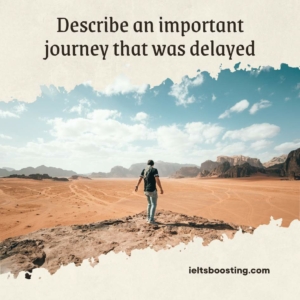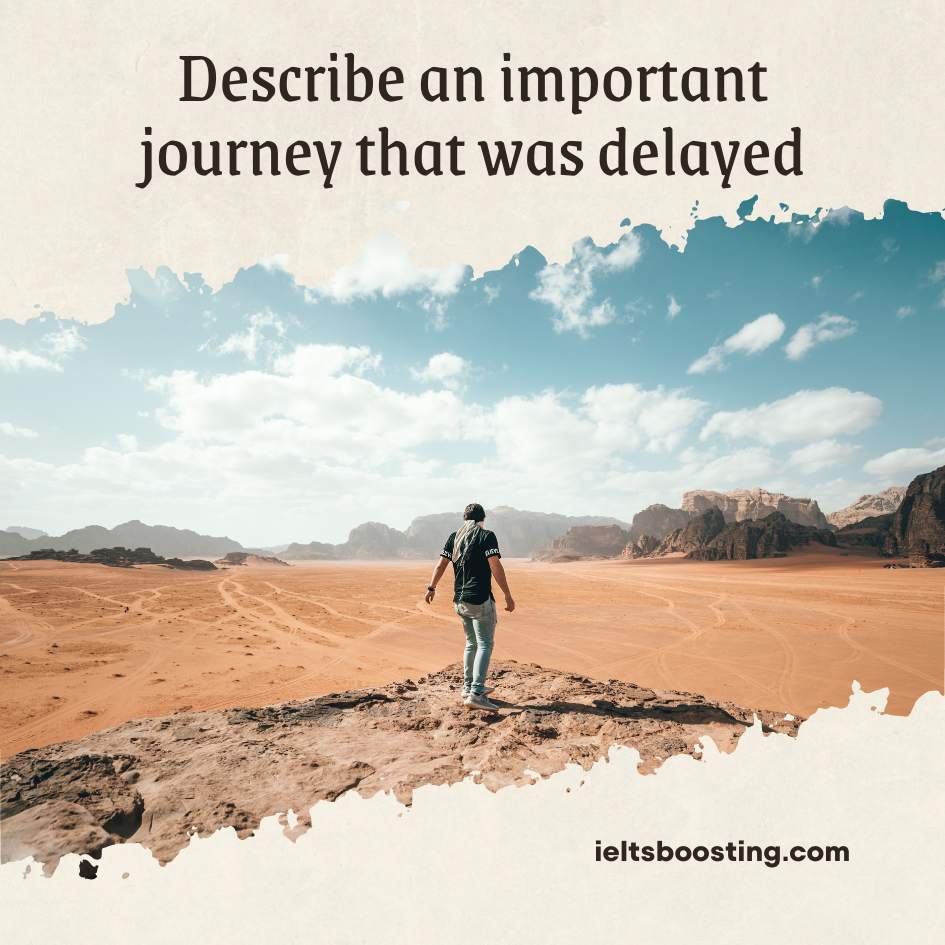Describe an important journey that was delayed
You should say
When it was
Why it was important
How it was delayed
And how you felt about it
Sample 2 to describe an important journey that was delayed
About five years ago, I had this big plan to go to Japan for a job interview. It was a dream job at a top company in my field, so you can imagine how important it was for me. But guess what? Just a few days before I was supposed to fly out, I realized my passport was nowhere to be found. I turned my place upside down looking for it and even tried to get a replacement fast, but no luck.
I had to tell the company what happened, and they were cool about it. They said we could do the interview online. I was relieved but also super worried because my internet’s always been a bit hit or miss. And, unfortunately, on the day of the interview, my worst fears came true. The connection was terrible! I kept asking them to repeat themselves because I couldn’t hear properly, and I’m sure my answers weren’t as good as they could have been.
In the end, I was really bummed out. I kept thinking, ‘If only I’d kept my passport in a safe place,’ or ‘If only the internet had worked better that day.’ It was a tough lesson, but it taught me to always have a backup plan and not to leave important things to the last minute.
Forecast speaking from 1-4 2024

Describe an important journey that was delayed
Part3 – Sample 2 to describe an important journey that was delayed
How to improve the traffic condition in a city?
To improve city traffic, first, we definitely need better public transportation, like more buses or a subway system, so people don’t have to drive everywhere. Then, making biking safer with bike lanes would encourage more people to cycle instead of driving. Also, carpooling should be promoted; if more people share rides, there’ll be fewer cars on the road. Lastly, flexible work hours could help too, so not everyone’s on the road at the same time during rush hour.
Do people still drive a car if public transportation is free of charge?
Yeah, even if public transport is free, I think a lot of people would still drive their cars. You know, it’s about convenience and comfort; having your own space and not worrying about crowded buses or train schedules. Plus, for some, driving is faster, especially if they live in areas not well-served by public transport. But, I do think free public transport might encourage some people to leave their car at home more often, especially during rush hours.
- Comfort: A state of physical ease and freedom from pain or constraint.
- Public Transport: Buses, trains, subways, and other forms of transportation that are available to the public.
- Rush Hour: The parts of the day when traffic is at its heaviest, usually when people are traveling to or from work.
- Commuter: A person who travels some distance to work on a regular basis.
- Traffic Jam: A line or lines of stationary or very slow-moving traffic, caused by roadworks, an accident, or heavy congestion.
- Eco-friendly: Not harmful to the environment.
- Urban Area: A geographical area constituting a city or town.
- Accessibility: The quality of being able to be reached or entered easily.
- Carbon Footprint: The amount of carbon dioxide and other carbon compounds emitted due to the consumption of fossil fuels by a particular person, group, etc.
How can transportation in rural areas be developed?
To develop transportation in rural areas, firstly, we need to build more roads that are actually in good condition, you know, so they’re safe and accessible all year round. Then, introducing regular bus services that connect these areas to nearby towns or cities would be super helpful for people who don’t have cars. Also, subsidies for transportation services could encourage more companies to operate in these areas, making it affordable. Plus, investing in bike paths and walking trails could promote healthier and more eco-friendly travel options for short distances.


